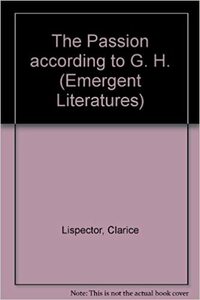You need to sign in or sign up before continuing.
Take a photo of a barcode or cover
I am not ready and will probably never be ready to talk about this book.
challenging
mysterious
medium-paced
Plot or Character Driven:
Character
Strong character development:
Complicated
Loveable characters:
Complicated
Diverse cast of characters:
No
Flaws of characters a main focus:
Complicated
hating bugs so much that seeing one triggers a depersonalization episode is so valid
clarice u have a new disciple 🙏
clarice u have a new disciple 🙏
challenging
emotional
inspiring
mysterious
reflective
slow-paced
Plot or Character Driven:
Character
Strong character development:
Complicated
Loveable characters:
Yes
Diverse cast of characters:
No
Flaws of characters a main focus:
Complicated
Libro de historia sencilla, pero de raras intensidades. Su quinta novela publicada en 1964. Entre la curiosidades de este libro es que lo escribe en una crisis personal y familiar, sin embargo ella afirmó que fue el libro que escribió con más alegría
don’t get me wrong this is very well written but unfortunately not my vibe. sooo not bad tho, life is just too short to try to read books that you feel like you’re walking in molasses thru.
On the surface, this is a book where a woman goes to clean out her old maids room and has an existential crisis.
About halfway through the book, the narrator offers an alternate title for her own story: “Lost in the Fiery Hall of a Canyon a Woman Desperately Struggles for Life.” This title is more descriptive than any summary involving bugs or maids or charcoal, because this book is not about bugs or maids or charcoal.
With all the philosophical introspection of Jean Paul Sartre’s Nausea, Clarice Lispector affirms humanity by decrying any attempt to transcend it. “Transcending is a transgression,” She says.
But to focus on quote from this book would be to focus on a single thought in a stream of consciousness. Each chapter in this novel forms a thought, and each thought begins where the other ends. This format serves to pull the reader into the mystical experience that is simultaneously tormenting and liberating the narrator. To further draw the reader in, she pleads with her reader to “hold her hand,” and addresses them as “my love.” But these repeated phrases don’t only serve the style of this book, but the message. Because the passion, to G.H. is a “horrible” thing, one that she compares to hell while simultaneously describing it as a baptism.
I’ve never read a book that makes use of religious symbolism in such a fascinating way. I highly recommend it to anyone interested in existentialism or experimental literature. But be warned: it’s not an easy read.
About halfway through the book, the narrator offers an alternate title for her own story: “Lost in the Fiery Hall of a Canyon a Woman Desperately Struggles for Life.” This title is more descriptive than any summary involving bugs or maids or charcoal, because this book is not about bugs or maids or charcoal.
With all the philosophical introspection of Jean Paul Sartre’s Nausea, Clarice Lispector affirms humanity by decrying any attempt to transcend it. “Transcending is a transgression,” She says.
But to focus on quote from this book would be to focus on a single thought in a stream of consciousness. Each chapter in this novel forms a thought, and each thought begins where the other ends. This format serves to pull the reader into the mystical experience that is simultaneously tormenting and liberating the narrator. To further draw the reader in, she pleads with her reader to “hold her hand,” and addresses them as “my love.” But these repeated phrases don’t only serve the style of this book, but the message. Because the passion, to G.H. is a “horrible” thing, one that she compares to hell while simultaneously describing it as a baptism.
I’ve never read a book that makes use of religious symbolism in such a fascinating way. I highly recommend it to anyone interested in existentialism or experimental literature. But be warned: it’s not an easy read.
'La pasión según G.H.' es, probablemente, la novela más difícil a la que me he enfrentado en los últimos años. Tal es el reto que impone Lispector al lector con este relato, que resulta sencillo imaginar cualquier alusión a su contenido como un acto absolutamente prosaico y superficial, por no decir innecesario.
¿Qué se puede decir ante esta obra? Para empezar, se trata de una prosa altamente sensitiva; sensitiva a la manera de los jardines renacentistas, cuya razón de ser era estimular a través de olores y sonidos; paisajes y texturas. Aquí Lispector construye su jardín particular, no sé si como caos ordenado o con precisión de relojero, pero con el que sin duda logra hostigar los cinco sentidos hasta alcanzar cotas de profundo terror psicológico y angustia material. Bien podría alojarse entres estas páginas tanto la claustrofobia de 'Repulsión', como las mentes pensantes de 'Silent Hill'. El soliloquio kafkiano de la protagonista es capaz de atraparte ferozmente para expulsarte de la narración acto seguido, en la siguiente página. Es así su complejidad.
Lispector juega constantemente con la dualidad: infierno y paraíso, sol y oscuridad, dentro y fuera, futuro y pasado... y su empeño de verbalizar lo indecible conduce exactamente a un imposible espacio intersticial que pudiese existir entre todos esos polos opuestos; lo que a su vez lleva hasta uno de los conceptos más recurrentes de la obra, 'lo neutro'. Y ahí cabe todo lo que pueda desear Clarice, que se muestra ambiciosa en cada uno de los embates que propone para dar forma al miedo y sus consecuencias más primitivas.
Ni para todo el mundo, ni para cualquier momento. Pero profundamente impactante.
¿Qué se puede decir ante esta obra? Para empezar, se trata de una prosa altamente sensitiva; sensitiva a la manera de los jardines renacentistas, cuya razón de ser era estimular a través de olores y sonidos; paisajes y texturas. Aquí Lispector construye su jardín particular, no sé si como caos ordenado o con precisión de relojero, pero con el que sin duda logra hostigar los cinco sentidos hasta alcanzar cotas de profundo terror psicológico y angustia material. Bien podría alojarse entres estas páginas tanto la claustrofobia de 'Repulsión', como las mentes pensantes de 'Silent Hill'. El soliloquio kafkiano de la protagonista es capaz de atraparte ferozmente para expulsarte de la narración acto seguido, en la siguiente página. Es así su complejidad.
Lispector juega constantemente con la dualidad: infierno y paraíso, sol y oscuridad, dentro y fuera, futuro y pasado... y su empeño de verbalizar lo indecible conduce exactamente a un imposible espacio intersticial que pudiese existir entre todos esos polos opuestos; lo que a su vez lleva hasta uno de los conceptos más recurrentes de la obra, 'lo neutro'. Y ahí cabe todo lo que pueda desear Clarice, que se muestra ambiciosa en cada uno de los embates que propone para dar forma al miedo y sus consecuencias más primitivas.
Ni para todo el mundo, ni para cualquier momento. Pero profundamente impactante.



